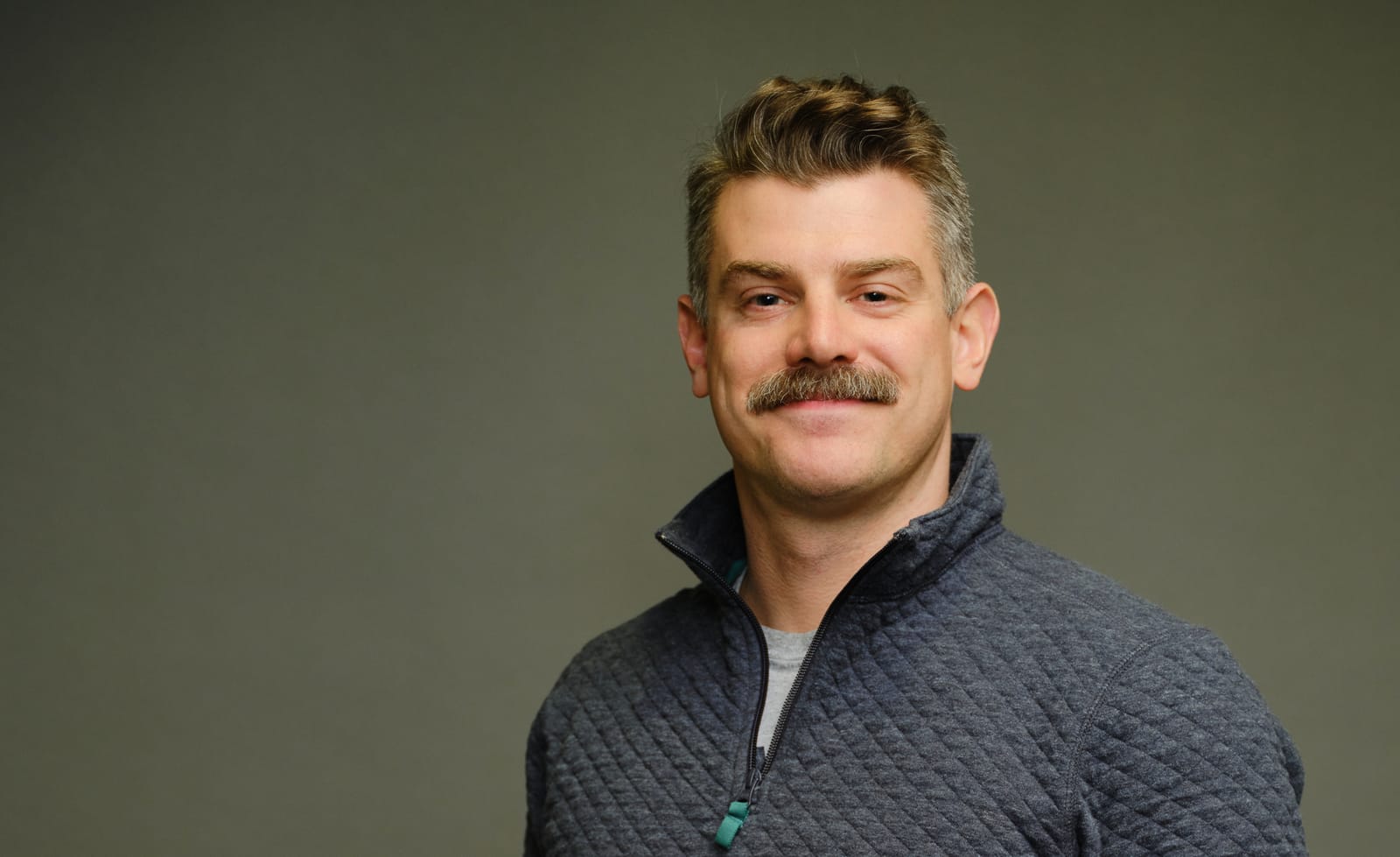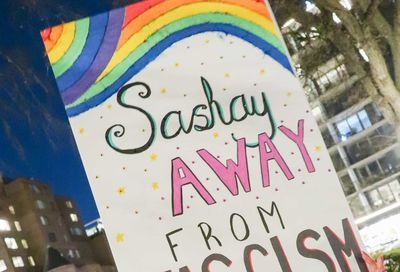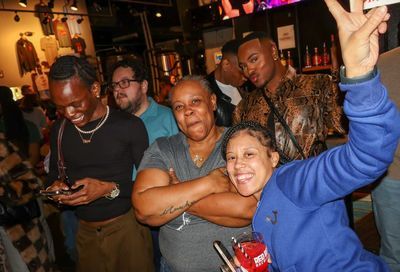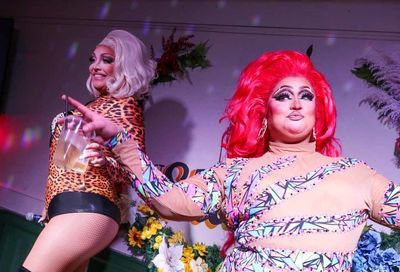Our Town: Celebrating a Decade of DJs, Dancing, and Drag
John Guggenmos, Ed Bailey, and Jim "Chachi" Boyle exclusively discuss a decade of Town Danceboutique
By Randy Shulman on June 28, 2018 @RandyShulman

“Don’t fuck it up.”
To hear John Guggenmos tell it, he planted the seed for the gay world’s most famous catchphrase.
“Years ago, I picked up RuPaul in my Audi,” says the local nightclub legend. “We paid her $900 for two shows at Tracks, Friday and Saturday. We were backstage getting ready to put her on. Now, I’m from Wyoming, and one of my degrees is in theater and dance. One of my professors, her big thing backstage would be to say, ‘Have a good show — and don’t fuck it up.’ So I said that to RuPaul, and she goes, ‘What?’ It’s now one of her taglines.”
“You’re responsible for that?” asks Jim “Chachi” Boyle, incredulous.
“Yes,” replies Guggenmos.
Ed Bailey, who has worked with Guggenmos since the days of Tracks, and has managed ten venues and parties with him — everything from Ozone to Halo to the currently thriving Number 9 and Trade — laughs. “John’s been angling on how to get this in this interview.”
Guggenmos, Bailey, and Boyle, along with Yusef Khatib, are the owners of Town Danceboutique, the gay nightclub that opened in late 2007 and took Washington’s LGBTQ community by… well, storm seems too quaint. Let’s say tidal wave. In just a decade, Town grew into a destination nightspot, one that, with each passing year, strengthened its community bonds — and beyond. (Mayor Bowser held her recent victory party there.) Town transported you out of the city and into its own magical world, one filled with fabulous drag queens and first-rate DJs, a place where people could feel good, and exhale.
One year ago, Town gave the community notice. The land it resided on had been sold, and the developers were razing the club to construct high-rise luxury residences in an area already overstuffed with high-rise luxury residences.

Guggenmos wryly points to the club’s gorgeous outdoor patio and sighs. “Do you think we would have put the money into developing that patio if we’d known we were going to be asked to leave?”
Guggenmos and Bailey, both 52, have been working together since their days managing Tracks, which held sway with the LGBTQ community in the ’80s and ’90s. Tracks, at the time, was arguably the city’s hottest nightclub. Then came Velvet Nation, a massive, weekly Saturday night extravaganza in the mammoth Nation nightclub. Both venues were eventually demolished to make way for Nationals Stadium. Some might call it the progress of economics. Others would term it a cultural loss. But Guggenmos, Bailey, and the 48-year-old Boyle saw the closing of Nation as an opportunity to create something from scratch in a neighborhood that was on the cusp of transitioning. Something more intimate. Something fresh. Something wonderful.

Environmentally warm and welcoming, Town felt like an embrace every time you walked through its doors. On a Saturday night, when the upstairs dance floor was jam-packed, Town typified the very essence of unbridled energy. Its weekly drag shows kicked off Friday and Saturday nights with a glittery explosion of joie de vivre. In a very short time, Town became more than just another nightclub, but a hub for the LGBTQ community. It became home.
“Gay nightclubs mean something completely different,” says Bailey, who also served as one of the club’s resident DJs. “They’re not just a nightclub, they’re a space for people that need a space.
“Traditionally, people have thought of nightclubs as being the problem of a neighborhood, a thing that brings a lot of negativity,” he continues. “But I don’t think people think of us that way. I do think it’s gonna be a different neighborhood without our energy here.”
For their part, Guggenmos, Bailey, and Boyle are shouldering the final days with resolve, though Bailey has made no secret in recent months that he’s profoundly devastated by the closing.
“There will be an emptiness,” he says, quietly.
“I choose not to feel,” jokes Guggenmos. “Because it’s just a business, you know? It’s just like selling socks somewhere else! If you stop doing it, why would you be so emotional about it?” He pauses. “Well, my mind keeps trying to convince me of that.” Nothing, of course, could be further from the truth, and during the course of a two-hour conversation, it becomes apparent that the loss for Guggenmos and Boyle cuts every bit as deep as it does for Bailey.
“There’s going to be stories about Town in five, ten years,” says Bailey. “It’s nice to know that we created the atmosphere for all those stories.”
Adds Guggenmos, “Meanwhile, we three will be playing bridge in our wheelchairs.”

METRO WEEKLY: Between the three of you, there is more than 75 years of experience in the nightlife arena. So who better to answer how nightlife has evolved in Washington from your specific points of view?
JOHN GUGGENMOS: I’ll jump in. Obviously online, Uber, all of those things have changed the gay community, period. But I think one of the things that always made us successful is that, even from even the early days of Tracks, we really thought of [our club venues] as an entertainment facility that happened to sell alcohol. So, those old days of just being “we’re going to open the door and have a shot special” really changed.
JIM “CHACHI” BOYLE: When we all started there were payphones in clubs, and now everyone has access to immediately call, post, Tweet, Snap, Insta-story. Before, you didn’t know how the night was until the next day, when people would say how the night was. Now people immediately know if there’s a great party going on because social media will be advertising it for us. It’s a huge instant notification to the world on how the party is.
ED BAILEY: Yes. People know exactly what’s going on all the time now. Used to be a few cool kids that would know everything and they were the movers and shakers, but now everybody has all of that access in their hand all the time. We tried to jump on that at the beginning when we opened. There were technologies that were playing into that concept of where people were. We were comping people who were checking in here on various social media platforms.

GUGGENMOS: Town was the first to be really plugged into social media. It was just taking off when we opened.
BAILEY: Our community was at the forefront of being socially interactive. So we have a larger mass audience in general than other places in our community. The traffic definitely helped us build something here in a way that was different from the way that we built them at other times in our career.
BOYLE: Nightlife is always evolving. I became introduced to John and Ed at Nation. I was a minority owner there. They were doing a Saturday party — Velvet Nation. When people came to Nation, it was a destination. They had a plan, they knew they were coming. You were committed if you came down there.
Now, you might come to Town, you might go to Nellie’s, you might go to Uproar, you might go to Dirty Goose. Everything’s within a block of each other. It’s a lot easier to go from A to B. Nation would close and people lined up trying to get taxis. It was hard to get a taxi. Uber wasn’t around. Now, people can decide at the last minute to come here — more so than they could have with Nation or Tracks. They knew all week they were going to Tracks and that was kind of the only option. Now they have more options. They can go to straight bars, they can go to other gay bars. Now there’s a lot more options. The venues have gotten smaller, there’s more bars, there’s a lot more gay friendly places than there ever was. Some people feel free walking the streets to the clubs that they didn’t feel, in my experience, 15, 20 years ago.
MW: You’re one of the only LGBTQ clubs that has an 18-and-up night.
BAILEY: It’s always been a part of what we’ve tried to do — have a business model where there is some opportunity for people under 21 to participate, because those are formative years. Where else are you gonna go where you’re going to feel like you can figure out who you are and what you’re all about, and what your potential community could be all about? That’s a really nice component to what we do. It feels like it helps people find their community when they are looking for one. Some of us who are older maybe feel more confident about where we fit, and how we belong, but how do we get there?
And what has definitely evolved is gay people bringing their straight friends to a club, which is a different concept for older clientele to see. Some are negative about it because their history would not be positive about having straight people in our space.

GUGGENMOS: I mean, just having that sense of being able to come somewhere and belong, and know that it will get better.
MW: We’ve been covering nightlife for 24 years, and there has always been this steady drumbeat of “Nightlife is dying, nightlife is dying.” Of course, that’s never been the case, but why do you think people say that?
BAILEY: When people say nightlife is dying, you have to try to define what they mean when they say nightlife. It means something different to everybody. Everyone’s trying to find something different when they go out. Whether it’s just interaction, or whether it’s meeting somebody just for the night, or meeting someone for the rest of their life, or whether it’s just feeling like you want to let off some steam, or get out of your own house, or be entertained and see a show, whether you love music. It means something different to everybody.
Being able to provide how people define that for themselves is what we’re in the business of doing. Trying to offer different DJs who may speak to different kinds of people that appreciate music, and to be able to evolve with the times and the fact that maybe less people are coming to a space like this to meet somebody to go home with for the night because there are considerably more efficient ways to do that with your phone. We all hope that there will never be a sense that entertainment will go out of style.

GUGGENMOS: Oh, entertainment will always be necessary.
BAILEY: We will contend that live entertainment is the best kind of entertainment. While you can see the performers that might be here on a night on YouTube before you come, or you can hear the DJs on Soundcloud before you come, there is something about the nature of seeing something live and being in a group of people that are experiencing that all at once that we’re hoping never goes out of style, because this is what we do. It’s what we love to do.
GUGGENMOS: But you evolve with it. I mean, an outdoor space before? Not necessary. Now, it’s critical.
BAILEY: When you first interviewed us when we were first opening, I think I said we are hoping that everything we have learned at this point has brought us to a place where we can institute all the good things — and hopefully eliminate all the bad things — that we’ve done for the last few decades. Looking back with some perspective now, I can say that we were successful in implementing things that we thought would be popular and attractive. I would also say that we cast a wider net than I think we had previously. I think that’s part of the evolution of our community, and what we’ve done here at this club. I do think it has resonated with considerably more people than other things than we’d done previously.
We have really created something that has been well-received by a large number of people, and that’s very satisfying and it is what we were trying to do. Many people try to do that, and not everybody succeeds, but I think we’ve been successful in doing that, and I’m very proud of it. We all are. I think we’ve been very adept at adapting to the reality of what things are possible here, and including as many things as we could and trying to go after them and figure out how they fit in this space.
It’s a very satisfying feeling to be in this space on a Friday to watch Bear Happy Hour transition into a room of college kids who all appreciate the space for what it offers them individually. And then they all mixed together in a way that would not happen really in any other location, or time and space.
MW: You guys have always put such meticulous care and extra effort into everything you do. You don’t have to — you would likely succeed despite it. So, why do you?
GUGGENMOS: It has to be a functional experience. Even to survive you make some of the most mundane things easier and better. For example, if you don’t have to stock a bar with ice by taking it through the crowd, that enhances the experience. If having a floor scrubber that just — I mean, smell it right now. It doesn’t smell like a bar! It doesn’t! I mean, I’ve had people come in here and say they’re amazed at how clean the place smells. Great sound and lights are a given, but it’s those other elements that you’re really not aware of that are critically important.

BAILEY: Yep. Bright enough to see that guy across the room, but not so bright that it’s uncomfortable to be seen seeing that guy across the room. One of the things people remark about what we do is that we do constantly change the space. There’ve been a lot of changes here. This area we’re sitting in used to be 18 inches higher than it is right now, which some people remember, but some people don’t. It also didn’t use to have all these windows.
BOYLE: Internally, this club has evolved over time. We have made lots of changes. Most of the people probably have no idea, unless they actually think about it, a lot of the subtle changes we’ve done. One of the things I’m proud about here is that you can walk all the way around the upstairs. That’s really hard to do in any club. You can walk behind the DJ booth. You can go all the way around, and that just kind of helps traffic flow. It just makes it a more enjoyable experience that you don’t have a choke point like we had at Nation. Going from one room to the other was really just a congested point, but that’s something we put focus on when we were building this out, to try to make sure that you could go from space to space, and it was easy to do it, and it wasn’t bumping into people.
BAILEY: A lot of people ask why gay bars close all the time, and I generally say that it is true that for a long time in our community, gay people did not have a lot of options. They have more options nowadays, but for a long time you could be a gay bar owner and not really have to do a whole lot to be successful. You just had to have a place and turn on the lights.
GUGGENMOS: And put up a rainbow flag.
BAILEY: We’re trying to create experiences. This is not just an assembly line where we’re trying to open the door, get them in, get the money, and get them out. I think that’s why a lot of bars have trouble succeeding.

MW: You’re not closing because of any business reasons. You’re closing because your landlord sold the land and you were asked to vacate.
GUGGENMOS: The land sold for an obscene amount of money — $25 million dollars. They’re building apartments here.
MW: So, it’s a misperception that people thought you owned the land?
GUGGENMOS: And that we cashed in, and quit? Yes, it’s a misperception.
BAILEY: I’ve had to reply to people who ask questions and send emails, and I’m like, “Okay, you do understand, we’ve had this business taken away from us.”

MW: Why do you think they don’t understand that?
GUGGENMOS: [Laughs.] Because most bar owners are greedy, horrible people.
BAILEY: A lot of people that aren’t in the restaurant and bar business assume that the restaurants, and bars, and nightclubs own the property they’re in. I’d say 90 percent of us lease our properties. We lease this. It already cost more than we could afford to build it out, nevermind buying the property too — that’s just not realistic. We don’t own the property, we never owned the property, never owned the building. It was a lease, and it got sold out from under us. We’re tenants and the new landlords would not extend our ability to be here.
The irony is I don’t think we started this project thinking we’d be here this long. And I don’t think, even midway, we could have gone on for another however many years from this point. And now that it’s being taken from us, it definitely feels like we could have gone on for quite a while. There’s something to be said about being at your peak of a business and going out like this. There’s something romantic about that notion, I guess.
GUGGENMOS: It’s just disappointing. When I told these two, I still remember their reactions. I was told at Tortilla Coast, and I remember walking back to the house just feeling like somebody killed my dog, you know? Then I didn’t say anything to either of them. They were like, “What’s wrong?” I said, “We’ll talk upstairs.” So we came to this corner.
BAILEY: We actually did it right in the spot we’re sitting in now.
GUGGENMOS: I told them and it was just, “Wait, say it again, what do you mean?”

BAILEY: I was like, “Are you serious?” Everything changed because this is our child — I use that analogy a lot. People say, well you have two other children, and I’m like, would you say that to a parent, who lost their child? The staff is our family. Not just the staff, but the performers, the DJs, and some of the customers.
GUGGENMOS: I know people use that word, they throw it around when they don’t mean it, but there is something very special about the connection here. We’re a family.
MW: How hard was it to tell the staff?
BAILEY: It sucked. But then, I am proud of the fact that we’ve been able to let everybody know — that there’s been a one-year celebration and no one is surprised. Everyone’s had a year to prepare. I mean, it still sucks, but we’ve had a year to prepare for it, our staff’s had a year to prepare, the different people we work with have had a year to prepare.
GUGGENMOS: We’ve tried to help transition people out as our staff. We’ve tried to get people plenty of notice.

MW: That was smart, otherwise you’d be living under a cloud of rumors.
BAILEY: I feel like there’s been rumors of our closing since we opened.
BOYLE: I’ve been through this before, because they were the promoter on Saturday, at Nation. I was the operator, and I was a minority owner, and when we got notice that we were being kicked out of Nation, I was like, well, I don’t know what to do. So when it came time to deal with this here, there wasn’t a hesitation. It was like, let’s share it with the staff. Let’s make sure that people are aware, and we have one year to have a year-long celebration. The final Halloween, the final New Year’s, the final Pride, the final whatever it was. I felt good about it. But unfortunately, we had the experience of closing a club already. So, it sucks. It’s disappointing and sad. I feel like so many people have grown up here in this space. It’s been around enough that there’s a dejavu aspect.
BAILEY: I spoke primarily when we did the announcement to the staff, and at one point in the middle of it, my voice just kind of cracked. There was an emotional part of it.

MW: How are you feeling right now, on the weekend before the closing party?
BOYLE: Proud. Definitely proud. I’ve always been proud to share the product we put out there, and I will put it up against any other business, club, any other place I’ve ever been. I think we’re pretty lucky — or I’m pretty lucky anyway — to have worked with great staff. And we’ve had some people that have been with us since the beginning. We have some people here that came from Nation — there’s still a couple floating around.
It’s gonna be a big change with Town gone. Not having a big gay space that’s gay-owned, gay-operated, that’s gay almost every night that we’re open — it’s gonna be gone and it’s sad. I think it will change the social atmosphere in the city.
Walking home the other day from here, I ran into two different people on the street that I know casually and they took their earbuds out just to tell me, “Thank you,” for what we provided for the ten years we provided it. So, I mean, I’m proud — very proud — of what we accomplished, what we’ve done. I feel great. And I’m also happy that we’re going out riding a wave of a year of people being appreciative of how great it is.
BAILEY: We did decide to tell everybody a year ago and that felt like owning the situation. It felt nice to kind of feel like you had some control, even though the reality was we didn’t really have control over this and we certainly didn’t want this to go this way. After we announced, for the first six months, I think when people would ask me how I felt about it — which, for the record, everybody does all the time — for the first six months I just did what I think most people do in polite society and I was like, “Well, you know, it sucks but it is what it is.”
And then, I don’t know what happened. Around the holidays I just decided I was going to be more honest with people. I have told people when they ask me, depending on how well I know them, that I am really profoundly sad that this is closing. I don’t know that this is the last thing we’re going to do — we are trying to figure out how to do another space, and that has not proven to be, so far, fruitful, but we’re working at it.
GUGGENMOS: We just don’t wanna do anything.
BOYLE: We’re not gonna settle for mediocre space.
BAILEY: I guess that there’s a chance that this could be the thing that you would consider to be a culmination of all of our experiences to try to create the best possible space we could, and so, if it’s gone and this is the end of that, that’s a really sad thing for me personally. But I also think it’s sad for the city. I’m very proud of what we created because it has provided a lot of things for a lot of people on a lot of levels. And so, for it to not be here is sad on a lot of those levels. It’s depressing. And that’s real, and I decided to be real about that after a while, as opposed to kind of sugarcoating it.
GUGGENMOS: Town could be the culmination, but it doesn’t feel that way. We spent a great deal of wasted time on a [potential new] space [that didn’t work out]. But there are a number of people that are assisting us in trying to locate another space.

MW: So you’re optimistic, John, that you’ll have another space?
GUGGENMOS: Yes. There’s a list of spaces that we’re looking.
BOYLE: We definitely, we have another space in us. There’s no doubt about it.
BAILEY: Oh, we have another club in us. We’re just hoping to find the right spot.
GUGGENMOS: It has to be. Because we don’t just want to do it if it’s not [right].
BOYLE: We’re not gonna settle.
BAILEY: We’ve set a standard for ourselves.
BOYLE: This is just the end of the chapter, it’s not the end of the story. There’s more chapters to be written. I’m confident in that. And we’ve talked about it. “Do we have another club in us?” And absolutely we do. One hundred percent we do. It’s just a matter of finding a space that fits our needs and we can build out to the standards that we think that we expect and we think our customers demand.

Town Danceboutique will hold its final Bear Happy Hour (21+) and Final Friday night 18+ party on Friday, June 29. Doors for Bear Happy Hour open at 5 p.m. Last entry is at 8:30 p.m.
The doors for Friday’s drag show open at 9 p.m. and the show starts at 9:30 p.m. Tickets for the drag show are sold out. If you have tickets, arrive early. General admission to the club will begin after the drag show has ended at approximately 11 p.m. Admission is $35 and is available in person, at the door only.
Town’s final party is Saturday, June 30. The doors for Saturday’s drag show open at 9 p.m. and the show starts at 9:30 p.m. Tickets for the show are sold out. If you have tickets, arrive early. General admission to the club will begin after the drag show has ended at approximately 11 p.m. General admission is $35 and is available in person, at the door only. Visit towndc.com.
Senior Editor Doug Rule contributed to this interview.
Attackers Use Grindr to Lynch Gay Israelis in Haifa
Groups of masked assailants are reportedly using the gay dating app to lure LGBTQ Israelis into meeting to maim or kill them.
By John Riley on March 16, 2025 @JRileyMW
Masked attackers in Israel are reportedly using Grindr to lure and entrap members of the LGBTQ community to severely harm them.
According to reports, the assailants are creating fake profiles on the popular dating app and arranging meetings in remote locations in the city of Haifa.
The victims are then ambushed and reportedly stabbed with sharp weapons. A few assailants have attempted to carry out lynchings.
The Aguda, an LGBTQ task force, documented at least ten such incidents in recent months, reports the Jerusalem Post.
But some victims have chosen not to report the attacks, making it more difficult for police to track down and arrest offenders.
What It Means To Be Queer at the Oscars
Put on your ruby slippers to strut down the red carpet as we ask what queerness means for Academy Awards voters past and present.
By Paul Klein
March 1, 2025
On March 2, Hollywood's elite will gather at the Dolby Theater in Los Angeles for the glitziest night of the year -- The 97th Academy Awards. When the Oscar-cast goes live on ABC Sunday evening -- and, for the first time ever, simultaneously streams on Hulu -- seven LGBTQ individuals will sit in hushed anticipation at the possibility of winning Hollywood's highest honors.
For a body often criticized for its lack of diversity and inclusivity, and with the arts under a prolonged political attack from far-right politicians, Sunday night offers a number of potentially groundbreaking moments for queer representation in front of and behind the screen.
Two College Students To Be Publicly Caned for Gay Sex
The couple, 24 and 18, were found guilty of violating Sharia law, which is strictly enforced in Indonesia's Aceh province.
By John Riley on February 25, 2025 @JRileyMW
Two college students in Indonesia have been sentenced to be publicly caned for engaging in same-sex relations.
The couple, aged 24 and 18, were arrested on November 7, 2024, after neighborhood vigilantes in the city of Banda Aceh, who suspected them of being gay, broke into their rented room to find them naked and hugging each other.
The lead judge, Sakwanah, said that the two students were "legally and convincingly" proven to have had gay sex -- which is forbidden under Sharia law -- and would thus be caned, receiving 85 and 80 lashes, respectively.
"During the trial it was proven that the defendants committed illicit acts, including kissing and having sex," she said. "As Muslims, the defendants should uphold the Sharia law that prevails in Aceh."
Support Metro Weekly’s Journalism
These are challenging times for news organizations. And yet it’s crucial we stay active and provide vital resources and information to both our local readers and the world. So won’t you please take a moment and consider supporting Metro Weekly with a membership? For as little as $5 a month, you can help ensure Metro Weekly magazine and MetroWeekly.com remain free, viable resources as we provide the best, most diverse, culturally-resonant LGBTQ coverage in both the D.C. region and around the world. Memberships come with exclusive perks and discounts, your own personal digital delivery of each week’s magazine (and an archive), access to our Member's Lounge when it launches this fall, and exclusive members-only items like Metro Weekly Membership Mugs and Tote Bags! Check out all our membership levels here and please join us today!
The Magazine
-
Most Popular
 'Porn Star University' Started by Gay-for-Pay Creator Andy Lee
'Porn Star University' Started by Gay-for-Pay Creator Andy Lee  Trump Targets Law Firm for Defending Transgender Rights
Trump Targets Law Firm for Defending Transgender Rights  Montana Governor Signs Anti-Trans Bills into Law
Montana Governor Signs Anti-Trans Bills into Law  Priyanka Shetty On Her Incisive New Solo Play '#Charlottesville'
Priyanka Shetty On Her Incisive New Solo Play '#Charlottesville'  Anheuser-Busch Abruptly Ends Sponsorship of St. Louis PrideFest
Anheuser-Busch Abruptly Ends Sponsorship of St. Louis PrideFest  Classical & Choral Music: Spring Arts Preview 2025
Classical & Choral Music: Spring Arts Preview 2025  Film: Spring Arts Preview 2025
Film: Spring Arts Preview 2025  Bea Arthur's Air Force Bio Purged by Department of Defense
Bea Arthur's Air Force Bio Purged by Department of Defense  Broadway: Spring Arts Preview 2025
Broadway: Spring Arts Preview 2025  Popular Music: Spring Arts Preview 2025
Popular Music: Spring Arts Preview 2025
 Film: Spring Arts Preview 2025
Film: Spring Arts Preview 2025  Classical & Choral Music: Spring Arts Preview 2025
Classical & Choral Music: Spring Arts Preview 2025  Broadway: Spring Arts Preview 2025
Broadway: Spring Arts Preview 2025  Gallery: The Emotionally Sensual Artwork of Soltian
Gallery: The Emotionally Sensual Artwork of Soltian  Montana Governor Signs Anti-Trans Bills into Law
Montana Governor Signs Anti-Trans Bills into Law  Above & Beyond: Spring Arts Preview 2025
Above & Beyond: Spring Arts Preview 2025  Trump Targets Law Firm for Defending Transgender Rights
Trump Targets Law Firm for Defending Transgender Rights  Priyanka Shetty On Her Incisive New Solo Play '#Charlottesville'
Priyanka Shetty On Her Incisive New Solo Play '#Charlottesville'  'Sister Act' at Ford's is a Heavenly Good Time
'Sister Act' at Ford's is a Heavenly Good Time  Popular Music: Spring Arts Preview 2025
Popular Music: Spring Arts Preview 2025
Scene
Metro Weekly
Washington's LGBTQ Magazine
P.O. Box 11559
Washington, DC 20008 (202) 638-6830
About Us pageFollow Us:
· Facebook
· Twitter
· Flipboard
· YouTube
· Instagram
· RSS News | RSS SceneArchives
Copyright ©2024 Jansi LLC.










You must be logged in to post a comment.